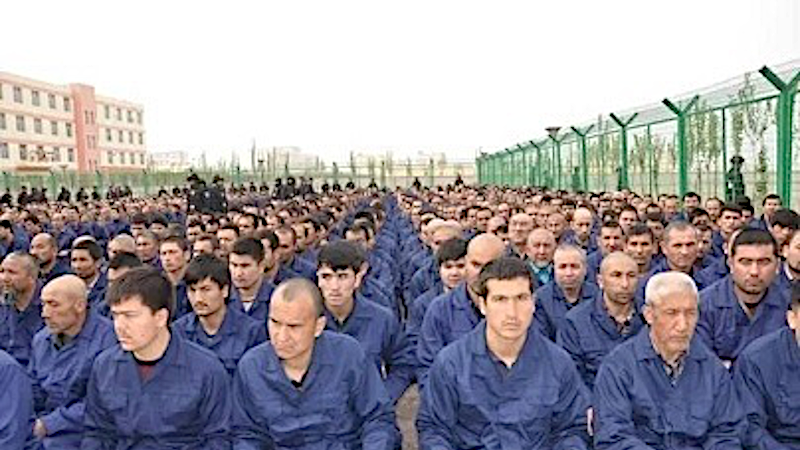

China’s northwestern province of Xinjiang has taken advantage of the international community’s focus on Gaza and US support for Israel, to tighten control of the region’s Turkic Muslim Uighur population, reshape Islam, and engage in social engineering.
As the international community grapples with the Gaza carnage, Xinjiang’s authorities updated regulations designed to further isolate religious communities from their counterparts abroad, align their religious doctrine with Chinese Communist Party principles, and weaken separate ethnic identities.
Intended to bring Xinjiang’s regulatory framework in line with national Chinese laws and regulations adopted since 2014, the revised rules came into force this week, days after China published a white paper outlining the legal framework for its counterterrorism efforts.
The regulations affect all religious groups, including Christians, Taoists, and Buddhists. However, they particularly affect Muslims who account for at least 50 per cent of Xinjiang’s 26 million people.
Activists charge the updates legalise various aspects of Chinese repression. A 2022 UN report concluded China was committing “serious human rights violations” in Xinjiang that may amount to crimes against humanity.
“This law is the legalization of all those previous actions,” said Bekzat Maksutkhan, a Kazakhstan-based activist focused on ethnic Kazakhs in Xinjiang.
The timing of the updated regulations and the paper is fortuitous, if not deliberate.
Determined not to be sucked into escalating Middle Eastern tensions, China is betting that Arab and Muslim states will look the other way as it seeks to redefine Islam.
In lockstep with Chinese efforts to reshape Islam, China’s tightly controlled Internet has been flooded with virulent anti-Semitic comments since the outbreak of the Gaza war in October.
China appears to see anti-Jewish hate speech as a means of fuelling anti-US and anti-Western sentiment in the Middle East and placating public opinion in the Middle East enraged by Western support for Israel.
Anti-Jewish comments include frequent comparisons of Jews to Nazis and conspiracy theories that American Jews control power and wealth in the United States.
In late January, Chinese social media influencer Zhou Zheng” posted on his Haokan Video account a video titled ‘Never Believe What the Jews Say.’
Mr. Zhou asserted that “homeless” and “filthy rich Jews” prior to the Holocaust had betrayed Germany by seizing control of the German economy prior to the Holocaust. Mr. Zhou claimed that Jews had collaborated with Japan against China in World War II and in the mid-1800s incited Britain to invade China.
China has reason to believe that its anti-Muslim and anti-Jewish campaigns are safe bets.
Arab and Muslim nations remained silent, and in some cases even endorsed past repression of the Uighurs, including the incarceration of an estimated one million in reeducation prisons.
The bet assumes that Arab and Muslim states, already disinclined to rock economic ties with China, will not want to strain relations at a time of uncertainty over the US commitment to Middle East security.
It also assumes that anti-Semitism will land on receptive ears because of the Gaza war, even if Arab media limit anti-Jewish as opposed to anti-Israeli speech.
China further assumes that Arab autocrats, like Saudi Crown Prince Mohammed bin Salman and United Arab Emirates President Mohammed bin Zayed, share with China an interest in controlling Islam and combatting political Islam.
China’s risk is that Arab autocrats’ calculations could change in the wake of the Gaza war.
Relations with China are likely to figure in recently revived US-Saudi defence cooperation talks. The talks were put on hold because of the war.
Saudi Arabia hopes to ultimately walk away from the talks with a legally binding US commitment to the kingdom and the region’s security, support for its ambitious civilian nuclear program, and a credible pathway to a resolution of the Israeli-Palestinian conflict in exchange for the establishment of diplomatic relations with Israel.
No one expects Saudi Arabia to weaken its economic ties with China, its largest oil customer. Nor is the kingdom expected to publicly criticise the People’s Republic.
Even so, the United States will seek to ring-fence Saudi Arabia’s relationship with China by limiting technology cooperation between the two countries and extracting a pledge that the kingdom will not host or endorse Chinese bases in the Gulf.
The limitations would involve Chinese surveillance technology prevalent across China that has been deployed in Xinjiang to keep Uyghurs in check.
In 2022, Saudi Arabia inked a deal during a visit by Chinese President Xi Jinping with Huawei Technologies Co., the communications giant the US sees as a stalking horse for Chinese Communist Party influence. The deal involves cloud computing and the building of high-tech complexes in Saudi cities and a data center.
In the past, Saudi Arabia has moved beyond looking the other way to endorse Uyghur repression.
China’s state-owned CCTV quoted Crown Prince Mohammed bin Salman as saying in 2019, “China has the right to take anti-terrorism and de-extremism measures to safeguard national security. Saudi Arabia respects and supports it and is willing to strengthen cooperation with China.”
The Chinese white paper asserts that China confronted a serious terrorism problem in the 2010s, but insists its crackdown on the Uyghurs was in line with the rule of law and respect for human rights.
Arguing that “religious extremism is not religion,” the paper said that China “while striking hard at unlawful and criminal terrorist activities…attaches greater importance to the education and rehabilitation of victims of extremist teachings who have committed only minor offenses.”
The paper frames the revised regulations that govern religions, and the responsibilities of indigenous religious organizations and professionals.
Home to 47 ethnic groups, Xinjiang’s Ili Kazakh autonomous prefecture one of China’s most ethnically diverse regions bordering on Kazakhstan, has taken the regulations a step further with the adoption of measures to encourage ethnic groups to mingle, as part of Mr. Xi’s goal to forge one national identity.
The measures promote mixed housing, a principle applied in Singapore, and the creation of cultural parks and public areas that “promote…a social structure and community environment that embeds all ethnic groups” and showcase the region as part of the “Chinese nation.”
Uyghurs have long complained that China has sought to dilute their presence in Xinjiang, their historic homeland, through labour transfer programs, by importing Han Chinese, and forcing birth control despite a 2021 official report that asserted a 1.67 per cent Uyghur compounded annual growth rate in the past two decades.
The updated regulations do not single out Muslims, but they are the prime target. They leave little room for doubt about their purpose. They aim is to create a Chinese Islam and Muslim culture that is defined by the party rather than religious tradition and practice and scholarly debate.
“Religious venues are to be, effectively, training grounds that promote the values of the Chinese Communist Party to the people” Human Rights Watch charged in a statement.
Religious communities, professionals, and activities must “practice Core Socialist Values” and “adhere to our nation’s orientation towards the Sinification of religion,” the regulations stipulate. They specify that religion should not interfere with “clothing, weddings, funerals, and other ethnic customs.”
The regulations oblige religious groups to ensure that “interpretations of religious teachings and rules (are) in line with contemporary China’s requirements for development and improvement, and in line with the outstanding traditional Chinese culture.”
The updates expand the 2014 rules that defined as “extremist” traditional Muslim attire, including men’s beards and women’s headscarves, and penalised possession of digital recordings of Qur’an recitations.
The updates require religious schools to “operate…with Chinese characteristics” defined as “cultivating patriotic religious talents” and “correctly interpreting religious doctrine.”
Legitimising a massive mosque remodelling campaign in recent years, the updates demand that “religious activity sites that are newly built or renovated, expanded, or rebuilt…reflect Chinese characteristics and style in areas such as their architecture, sculptures, paintings, and decorations.”
A 2020 Australian Strategic Policy Institute study concluded that two-thirds of Xinjiang’s had already been altered, often removing domes and minarets. Human Rights Watch reported last year that Sinicising mosques had expanded beyond Xinjiang into other Chinese provinces.
China’s efforts to Sinicise Islam have so far stopped short of altering doctrine. Also, China has not detailed what a “correct interpretation” would be beyond a reference to patriotism. Tackling the doctrine may be a red line for Arab and Muslim nations that China does not want to cross.
Nevertheless, China has gotten away with murder. Imagine the uproar that would erupt if a non-Muslim country attempted to reshape Islam.


